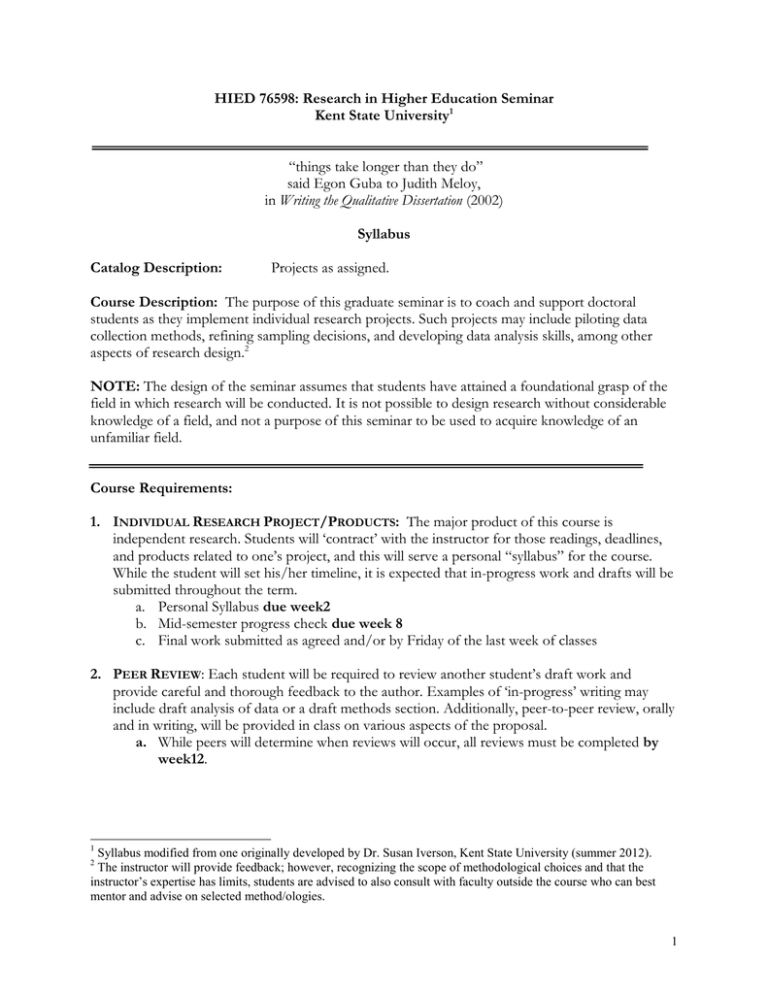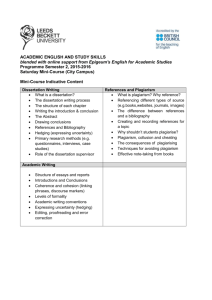HIED 76598: Research in Higher Education Seminar Kent State University Syllabus
advertisement

HIED 76598: Research in Higher Education Seminar Kent State University1 “things take longer than they do” said Egon Guba to Judith Meloy, in Writing the Qualitative Dissertation (2002) Syllabus Catalog Description: Projects as assigned. Course Description: The purpose of this graduate seminar is to coach and support doctoral students as they implement individual research projects. Such projects may include piloting data collection methods, refining sampling decisions, and developing data analysis skills, among other aspects of research design.2 NOTE: The design of the seminar assumes that students have attained a foundational grasp of the field in which research will be conducted. It is not possible to design research without considerable knowledge of a field, and not a purpose of this seminar to be used to acquire knowledge of an unfamiliar field. Course Requirements: 1. INDIVIDUAL RESEARCH PROJECT/PRODUCTS: The major product of this course is independent research. Students will ‘contract’ with the instructor for those readings, deadlines, and products related to one’s project, and this will serve a personal “syllabus” for the course. While the student will set his/her timeline, it is expected that in-progress work and drafts will be submitted throughout the term. a. Personal Syllabus due week2 b. Mid-semester progress check due week 8 c. Final work submitted as agreed and/or by Friday of the last week of classes 2. PEER REVIEW: Each student will be required to review another student’s draft work and provide careful and thorough feedback to the author. Examples of ‘in-progress’ writing may include draft analysis of data or a draft methods section. Additionally, peer-to-peer review, orally and in writing, will be provided in class on various aspects of the proposal. a. While peers will determine when reviews will occur, all reviews must be completed by week12. 1 Syllabus modified from one originally developed by Dr. Susan Iverson, Kent State University (summer 2012). The instructor will provide feedback; however, recognizing the scope of methodological choices and that the instructor’s expertise has limits, students are advised to also consult with faculty outside the course who can best mentor and advise on selected method/ologies. 2 1 3. RESEARCHER JOURNAL: Students must keep a descriptive, reflexive journal throughout the course. Borg3 (2001) notes the benefits of a researcher journal for reflective process as well as a product that “can deepen researchers’ understanding of their work” (p. 170). Your researcher journal might include: reflections on your efforts to collect and analyze data, questions that emerge, potential directions or explorations (taken and abandoned), ideas spurred by a reading, fears and anxieties, revelations and achievements, as well as research design decisions. Progress on your journal may be solicited periodically; the complete journal is due by Friday of the last week of classes. 4. DISSERTATION REVIEW: Identify and read one dissertation related to your area of study and specific to your methodological approach. Submit a review/critique of the dissertation, its relevance to your work, and how reading it has deepened and/or clarified your understanding of dissertation writing. This review can be a 2-4pg essay or 2-4 journal entries. The latter, for instance, might focus on different aspects of the dissertation, i.e. an entry on the literature review (how was it organized; how it the literature used to “set the stage”; how clearly do the research questions emerge from the review of literature?); another entry may be focused on the methods chapter, or how the author describes and uses the conceptual or theoretical framework. Written work must be completed by week10. GRADING: This seminar is graded as S/U. Satisfactory doctoral-level work (or to earn “S”) equates to a minimum of “B” or 3.0 or 85%. The following are required for “Satisfactory” completion of the course: - Peer Review 10% - Dissertation review 15% - Research journal 25% - Independent Research Products (as contracted) 50% Course readings: No text is required for this class. Students are recommended to read the following: Hostetler, K. (2005). What is “good” educational research? Educational Researcher, 34(16), 16-21 Rocco, T.S., & Plakhotnik, M.S. (2009). Literature, reviews, conceptual frameworks, and theoretical frameworks: Terms, functions, and distinctions. Human Resources Development Review, 8(1), 120130. Randolph, J.J. (2009). A guide to writing the dissertation literature review. Practical Assessment, Research & Evaluation, 14(13), 1-13. Webb, W.B. (1961). The choice of the problem. American Psychologist, 16(5), 233-7. Required style guideline: 3 Borg, S. (2001). The research journal: A tool for promoting and understanding researcher development. Language Teaching Research, 5(2), 156-177. 2 Publication Manual of the American Psychological Association, 6th ed. (2010). Washington, D.C.: American Psychological Association. [2nd printing, October 2009]. ISBN-10: 1-4338-0561-8] Other resources: Butin, D.W. (2010). The education dissertation: A guide for practitioner scholars. Corwin Press. ISBN: 978141290441. Cooper, H. M. (1998). Synthesizing research: A guide for literature reviews (3rd ed.). Thousand Oaks, CA: Sage Publications. Creswell, J.W. (2009). Research design: Qualitative, quantitative, and mixed methods approaches, 3rd ed. Thousand Oaks, CA: Sage. ISBN: 978-1-4129-6557-6. Drake, P., with Heath, L. (2011). Practitioner research at doctoral level: Developing coherent research methodologies. New York: Routledge. Gardner, S.K., & Mendoza, P. (Eds.). (2010). On becoming a scholars: Socialization and development in doctoral education. Sterling, VA: Stylus. Rudestam, K.E., & Newton, R.R. (2001). Surviving your dissertation: A comprehensive guide to content and process (2nd ed.). Thousand Oaks, CA: Sage. van Leunen, Mary-Claire. (1992). A handbook for scholars: A complete guide to the mechanics of scholarly writing, 2nd ed. Oxford University Press. General Information: Accommodation: University policy 3342-3-18 requires that students with disabilities be provided reasonable accommodations to ensure their equal access to course content. If you have a documented disability and require accommodations, please contact the instructor at the beginning of the semester. Please note, you must first verify your eligibility for academic accommodation through Student Accessibility Services; they can be reached at 330-672-3391 and are located on the ground floor of the DeWeese Center. FMI about your rights and responsibilities, see http://www.registrars.kent.edu/disability/Current/StudentHandbook/RightsReas.htm Academic Integrity: As members of the community of higher education, we are all subject to the standards of academic integrity. Students are subject to the Code of Student Conduct. Using another person’s words, thoughts or ideas without proper attribution is plagiarism and a form of academic dishonesty. Academic dishonesty is a violation of University policy. All students must become familiar with and abide by the University’s policy on academic integrity, which prohibits cheating and plagiarism. For more information about University policy see The University Policy Register at http://imagine.kent.edu/policyreg/ Further, I direct your attention to the APA style manual for a statement on plagiarism and a helpful example of how to paraphrase. Finally, Indiana University offers a useful guide regarding plagiarism: http://www.indiana.edu/~wts/pamphlets/plagiarism.shtml 3 More specific to doctoral level risks of plagiarism, I recommend reading, “Literal and Intelligent Plagiarism: Students Beware! (Available at http://dissprep.wikispaces.com/plagiarism) NOTE: Portions of this syllabus are inspired by or adapted from syllabi developed by California State University, San Bernardino (EDUC790); Drs. Kloosterman and McMullen, IUPUI; and Dr. Mary Madden, University of Maine; Robert Ferris, Columbia International University. Draft Feb.2013 4


